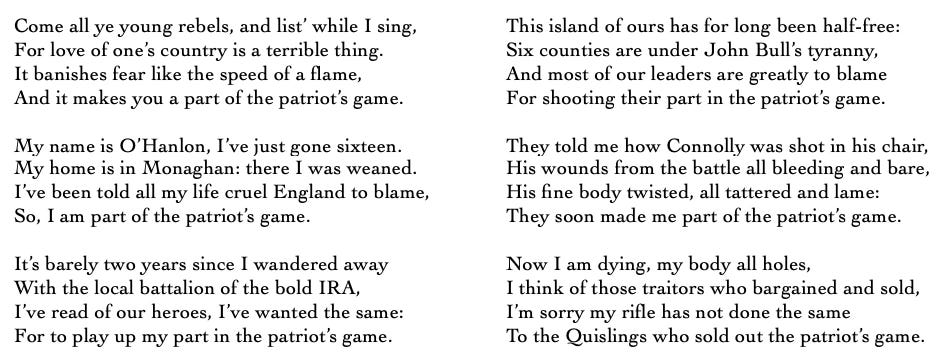I’d be around 13 or 14 years of age and was spending an evening playing cards with my parents. Dad had just returned from a business trip to Limerick and, whilst there, had browsed for some local flavour in the record shop at Shannon Airport.
The game was Casino, but instead of keeping her eyes peeled for the two of spades and the ten of diamonds, mother’s ears were attuned to the lilting Irish tones wafting through from the dining room. That is, until she heard the immortal words the bold IRA. Ross McWhirter had just been assassinated on his London doorstep by said bold IRA and these were not words welcome in my parents’ ears. Father quickly advanced the needle to the next track, and already Kitty was on her way down from Limerick.
The next weekend, my curiosity pricked, I re-listened to the entire track. I’d learned that music is more than wallpaper to accompany a game of cards. It is an expression of energy. It is an expression of woe. It is a message and, when people send messages, it can behove us to heed them.
The Patriot Game is no ancient Irish ballad, but was written in the 1950s to commemorate a failed attack by Irish republicans against the occupying forces, as they saw it, of Britain, and it originally lashed out against those who were deemed to have acted against Ireland’s best interests (Éamon de Valera, for instance).
I’ve recently posted about the lingering effects that the Great Famine and the fight for Irish independence have had on current policy in Ireland towards Palestine. There is a flip side to this, however, just as we are seeing a flip side to the Holocaust. The party that suffered and was ultimately vindicated can also turn tail and become the oppressor. The Irish suffered discrimination and ridicule when hunger chased them across the seas to a better life in America, in Britain and in the EU. But there are some today in Ireland who vaunt Ireland’s struggle for self-determination and use it to repulse today’s hungry, huddled masses that clamour in turn at Ireland’s doors for mercy and succour.
Notes to the text
Fergal O’Hanlon was a volunteer in the Irish Republican Army (IRA) who, at age 20, was killed during an attack on the Royal Ulster Constabulary, in 1957.
Monaghan is the county town of the Ulster county of the same name, and where O’Hanlon was born and weaned.
The six counties refers to the portion of the Province of Ulster that currently remains in the UK.
John Bull is the traditional characterisation of England.
General James Connolly led the Irish Citizens’ Army in the defence of the General Post Office in Dublin during the Easter Rising of 1916. He was so badly injured that he could not stand so that, when he was executed by firing squad, he was bound to a chair.
Vidkun Quisling was a Norwegian collaborator during the Nazi occupation (1942-1945) of that country. His name became a by-word for traitor.
The Patriot Game
Written by Dominic Behan, based on the traditional melody “One Morning In May”
Performed by The Dubliners
From their 1971 album The Patriot Game
The moral imperative of a trumpet
A gobshite is a stupid and incompetent person. Pronounced gob-shahyt.





